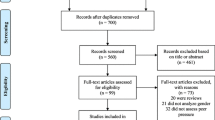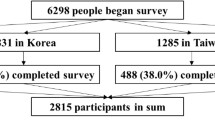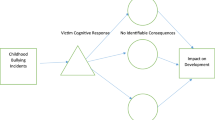Abstract
Objectives
The paper examines how strongly non-physical peer sexual harassment is associated with a wide range of well-being outcomes from symptoms of depression and anxiety to self-esteem and body image.
Methods
Two large community samples of high school students were analyzed (n = 1384 and n = 1485). Students responded to questionnaires on being subject to non-physical sexual harassment, sexual coercion and forced intercourse, and to well-being indicators ranging from anxiety, depression, self-esteem, body image.
Results
Regression analyses suggest that being harassed by peers in a non-physical way was moderately associated with lower levels of well-being over and above the effect of other risk factors. This effect was present for all indicators of well-being. The effect of peer harassment on depressive symptoms was moderated by sex (affected women more) but not by sexual or ethnic minority status.
Conclusions
The findings imply that although sticks and stones may break bones, it does seem that derogatory words and other forms of non-physical sexual harassment definitely harm high school students.

Similar content being viewed by others
References
Alsaker FD (1992) Pubertal timing, overweight, and psychological adjustment. J Early Adolesc 12:396–419
Alsaker FD, Olweus D (1986) Assessment of global negative self-evaluations and percieved stability of self in Norwegian preadolscents and adolescents. J Early Adolesc 6:269–278
American Association of University Women (2001) Hostile hallways: bullying, teasing, and sexual harassment in school. American Association of University Women, Washington, DC
Bech P, Rasmussen NA, Olsen LR, Noerholm V, Abildgaard W (2001) The sensitivity and specificity of the Major Depression Inventory, using the Present State Examination as the index of diagnostic validity. J Affect Disord 66:159–164
Bendixen M, Kennair LEO (2014) Resultater fra prosjekt Seksuell helse og trakassering i videregående opplæring 2013–2014 [Findings from the Sexual health and harassment project in high school education 2013-2014]. vol ISBN 978-82-8094-018-6 (pdf). NTNU, Trondheim
Bendixen M, Kennair LEO (2017) Advances in the understanding of same-sex and opposite-sex sexual Harassment. Evol Hum Behav 38:583–591. https://doi.org/10.1016/j.evolhumbehav.2017.01.001
Buss DM, Duntley JD (2008) Adaptations for exploitation Group Dyn 12:53–62
Chiodo D, Wolfe DA, Crooks C, Hughes R, Jaffe P (2009) Impact of sexual harassment victimization by peers on subsequent adolescent victimization and adjustment: a longitudinal study. J Adolesc Health 45:246–252. https://doi.org/10.1016/j.jadohealth.2009.01.006
Collier KL, van Beusekom G, Bos HMW, Sandfort TGM (2013) Sexual orientation and gender identity/expression related peer victimization in adolescence: a systematic review of associated psychosocial and health outcomes. J Sex Res 50:299–317. https://doi.org/10.1080/00224499.2012.750639
Connolly J et al (2015) Evaluation of a youth-led program for preventing bullying, sexual harassment, and dating aggression in middle schools. J Early Adolesc 35:403–434. https://doi.org/10.1177/0272431614535090
Dahlqvist HZ, Landstedt E, Young R, Gadin KG (2016) Dimensions of peer sexual harassment victimization and depressive symptoms in adolescence: a longitudinal cross-lagged study in a Swedish sample. J Youth Adolesc. https://doi.org/10.1007/s10964-016-0446-x
de Lijster GPA, Felten H, Kok G, Kocken PL (2016) Effects of an interactive school-based program for preventing adolescent sexual harassment: a cluster-randomized controlled evaluation study. J Youth Adolesc 45:874–886. https://doi.org/10.1007/s10964-016-0471-9
Dey EL (1997) Working with low survey response rates: the efficacy of weighting adjustments. Res High Educ 38:215–227. https://doi.org/10.1023/A:1024985704202
Duffy J, Wareham S, Walsh M (2004) Psychological consequences for high school students of having been sexually harassed. Sex Roles 50:811–821. https://doi.org/10.1023/B:SERS.0000029099.38912.28
Felix ED, McMahon SD (2006) Gender and multiple forms of peer victimization: how do they influence adolescent psychosocial adjustment? Violence Vict 21:707–724
Gotlib IH, Hammen CL (2015) Handbook of depression. Guilford Press, New York
Gruber JE, Fineran S (2008) Comparing the impact of bullying and sexual harassment victimization on the mental and physical health of adolescents. Sex Roles 59:1–13. https://doi.org/10.1007/s11199-008-9431-5
Kennair LEO, Bendixen M (2012) Sociosexuality as predictor of sexual harassment and coercion in female and male high school students. Evol Hum Behav 33:479–490. https://doi.org/10.1016/j.evolhumbehav.2012.01.001
Landstedt E, Gillander Gådin K (2011) Experiences of violence among adolescents: gender patterns in types, perpetrators and associated psychological distress. Intl J Pub Health 56:419–427. https://doi.org/10.1007/s00038-011-0258-4
Lichty LF, Campbell R (2012) Targets and witnesses: middle school students’ sexual harassment experiences. J Early Adolesc 32:414–430. https://doi.org/10.1177/0272431610396090
Lindell MK, Whitney DJ (2001) Accounting for common method variance in cross-sectional research designs. J Appl Psychol 86:114. https://doi.org/10.1037/0021-9010.86.1.114
Marshall SK, Faaborg-Andersen P, Tilton-Weaver LC, Stattin H (2013) Peer sexual harassment and deliberate self-injury: longitudinal cross-lag investigations in Canada and Sweden. J Adolesc Health 53:717–722. https://doi.org/10.1016/j.jadohealth.2013.06.009
Mitchell KJ, Ybarra ML, Korchmaros JD (2014) Sexual harassment among adolescents of different sexual orientations and gender identities. Child Abuse Negl 38:280–295. https://doi.org/10.1016/j.chiabu.2013.09.008
Nolen-Hoeksema S (2001) Gender differences in Depression. Curr Dir Psychol Sci 10:173–176
Ormerod AJ, Collinsworth LL, Perry LA (2008) Critical climate: relations among sexual harassment. Climate, and outcomes for high school girls and boys. Psychol Women Q 32:113–125. https://doi.org/10.1111/j.1471-6402.2008.00417.x
Paludi MA (1997) Sexual harassement in schools. In: O’Donohue W (ed) Sexual harassement: theory, research, and treatment. Allyn and Bacon, Boston, pp 225–249
Petersen JL, Hyde JS (2009) A longitudinal investigation of peer sexual harassment victimization in adolescence. J Adolesc 32:1173–1188. https://doi.org/10.1016/j.adolescence.2009.01.011
Pina A, Gannon TA, Saunders B (2009) An overview of the literature on sexual harassment: perpetrator, theory, and treatment issues. Aggress Violent Behav 14:126–138. https://doi.org/10.1016/j.avb.2009.01.002
Podsakoff PM, MacKenzie SB, Lee J-Y, Podsakoff NP (2003) Common method biases in behavioral research: a critical review of the literature and recommended remedies. J Appl Psychol 88:879. https://doi.org/10.1037/0021-9010.88.5.879
Rosenberg M (1965) Society and the adolescent self-image. Princeton University Press, Princeton
Skoog T, Özdemir SB, Stattin H (2015) Understanding the link between pubertal timing in girls and the development of depressive symptoms: the role of sexual harassment. J Youth Adolesc. https://doi.org/10.1007/s10964-015-0292-2
Slaatten H, Anderssen N, Hetland J (2015) Gay-related name-calling among Norwegian adolescents—harmful and harmless. Scand J Psychol 56:708–716. https://doi.org/10.1111/sjop.12256
StataCorp (2015) Stata Statistical Software: release 14. StataCorp LP, College Station
Strand BH, Dalgard OS, Tambs K, Rognerud M (2003) Measuring the mental health status of the Norwegian population: a comparison of the instruments SCL-25, SCL-10, SCL-5 and MHI-5 (SF-36). Nord J Psychiatry 57:113–118. https://doi.org/10.1080/08039480310000932
Acknowledgements
Thanks to Sør-Trøndelag County Authority for supporting this research, and to the students and staff of the participating high schools. Mons Bendixen (MB) and Leif Edward Ottesen Kennair (LEOK) conceived the study, designed and coordinated both studies, and drafted the manuscript. MB performed the final statistical analyses. MB and LEOK participated in the interpretation of the data. Josef Daveronis (JD) participated in the development of the research questions, performed the initial statistical analyses and drafted the manuscript. All authors read and approved the final manuscript.
Author information
Authors and Affiliations
Corresponding author
Ethics declarations
Ethical statement
The study was carried out in line with the American Psychological Association’s ethical principles of psychologists and code of conduct.
Appendix
Appendix
Harassment acts, Study 1
-
1.
Unpleasant sexual gazes†.
-
2.
Denigrating comments such as “cunt”, “prick”, “bitch”, “whore”, etc.
-
3.
Denigrating comments such as “gay”, “lesbo”, “fag”, “dyke”, etc.
-
4.
Dirty/debasing talk or denigrating comments on body or looks.
-
5.
Shown sexually laden pictures or objects.
-
6.
Having had sexual rumors spread.
-
7.
Having had pictures of you distributed online when undressed.
-
8.
Receiving sexual content through electronic media (mobile or internet).
-
9.
Sexual requests (being asked for sexual service).
Note: † this item was not part of the Study 2 list of items.
Harassment acts, Study 2
-
1.
Denigrating comments such as “whore”, “manwhore”, “slut”, “manslut”, “loose”, etc.
-
2.
Denigrating comments such as “gay”, “lesbo”, “fag”, “dyke”, etc.
-
3.
Denigrating comments such “cunt”, “prick”, “asshole”, “bitch”, etc.
-
4.
Dirty/debasing talk or denigrating comments on body or looks.
-
5.
Shown sexually laden pictures or objects.
-
6.
Having had sexual rumors spread.
-
7.
Having had pictures of you distributed online when undressed.
-
8.
Receiving sexual content through electronic media (mobile or internet).
-
9.
Sexual requests (being asked for sexual service).
Note: All items were coded 0 = no and 1 = yes.
Rights and permissions
About this article
Cite this article
Bendixen, M., Daveronis, J. & Kennair, L.E.O. The effects of non-physical peer sexual harassment on high school students’ psychological well-being in Norway: consistent and stable findings across studies. Int J Public Health 63, 3–11 (2018). https://doi.org/10.1007/s00038-017-1049-3
Received:
Revised:
Accepted:
Published:
Issue Date:
DOI: https://doi.org/10.1007/s00038-017-1049-3




